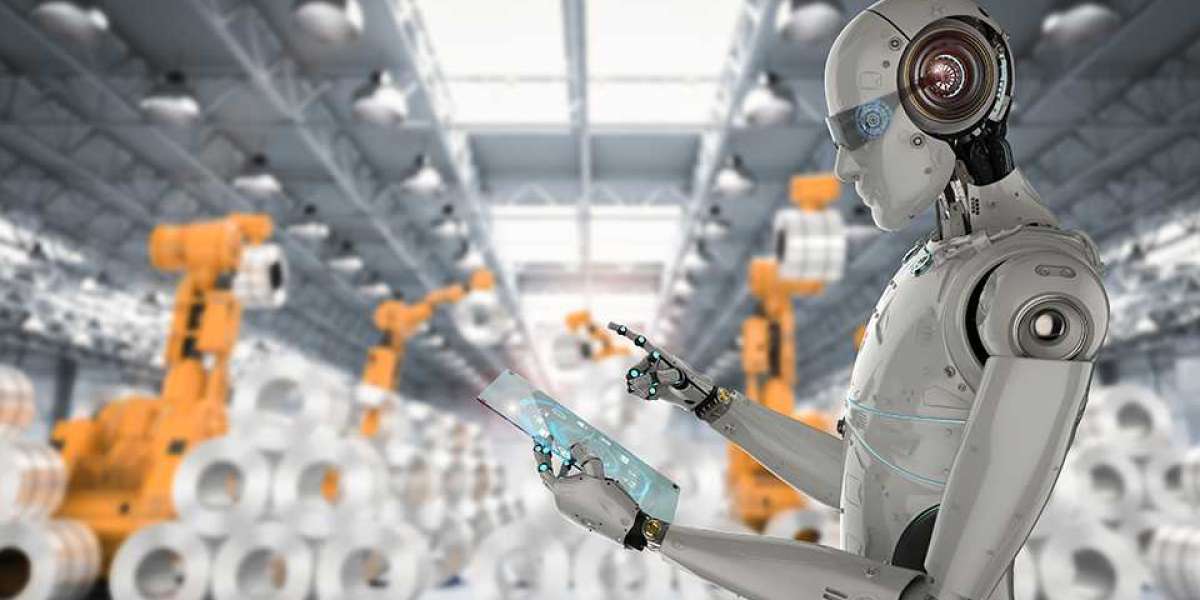Artificial Intelligence (AI) in Manufacturing Market: Market Overview
Artificial Intelligence (AI) is transforming the manufacturing industry by enhancing productivity, efficiency, and flexibility. The AI in Manufacturing Market is experiencing rapid growth, driven by the increasing adoption of AI technologies to automate processes, predict maintenance needs, optimize supply chains, and improve product quality. AI applications in manufacturing range from robotics and machine vision to predictive analytics and cognitive computing, making it a critical component of Industry 4.0. The Artificial Intelligence (AI) in Manufacturing Market industry is projected to grow from USD 2.03 Billion in 2023 to USD 31.47 Billion by 2032.
The integration of AI in manufacturing enables real-time data analysis, leading to smarter decision-making and more efficient operations. By leveraging AI, manufacturers can reduce downtime, minimize errors, and enhance their competitive edge in a rapidly evolving market. As industries continue to digitalize and adopt advanced technologies, the demand for AI in manufacturing is expected to surge, offering significant opportunities for growth and innovation.
Request To Free Sample of This Strategic Report - https://www.marketresearchfuture.com/sample_request/7745
Key Market Segments
By Technology
- Machine Learning: Utilized for predictive maintenance, quality control, and demand forecasting.
- Computer Vision: Applied in automated quality inspection, defect detection, and machine vision systems.
- Natural Language Processing (NLP): Used for human-machine interaction and enhancing communication within manufacturing systems.
- Context-aware Computing: Facilitates real-time decision-making based on contextual data.
By Application
- Predictive Maintenance and Machinery Inspection: AI predicts equipment failures and schedules maintenance to prevent downtime.
- Quality Control and Inspection: AI-driven vision systems detect defects and ensure product quality.
- Production Planning: AI optimizes production schedules and processes, improving efficiency.
- Inventory Management: AI enhances supply chain management by optimizing inventory levels and reducing waste.
- Robotic Process Automation (RPA): AI-powered robots automate repetitive tasks, increasing productivity.
- Others: Including energy management, workforce management, and cyber-physical systems.
By Industry Vertical
- Automotive: AI improves production efficiency, quality, and supply chain management.
- Electronics: AI enhances precision and speed in manufacturing complex electronic components.
- Aerospace and Defense: AI ensures high-quality standards and optimizes production processes.
- Pharmaceuticals: AI aids in precision manufacturing and quality control of medical products.
- Food and Beverages: AI enhances production efficiency, quality, and safety standards.
- Others: Including textiles, consumer goods, and heavy machinery.
Industry Latest News
The AI in manufacturing market is continually evolving, with significant advancements and collaborations shaping its trajectory. In June 2024, Siemens announced a strategic partnership with Google Cloud to integrate AI capabilities into its industrial automation systems. This collaboration aims to leverage Google Cloud's AI and machine learning technologies to enhance Siemens' industrial automation solutions, enabling manufacturers to optimize processes and improve operational efficiency.
In April 2024, IBM launched a new AI-driven manufacturing platform, IBM AI for Manufacturing, designed to provide real-time insights and predictive analytics to manufacturing operations. This platform integrates advanced AI technologies to help manufacturers improve quality control, reduce downtime, and enhance productivity.
The increasing number of AI startups focusing on manufacturing applications is also noteworthy. These startups are driving innovation by developing cutting-edge solutions tailored to the unique needs of the manufacturing sector. The growing interest from venture capitalists in funding AI-driven manufacturing startups further underscores the potential of this market.
Key Companies
- Siemens AG: A leader in industrial automation and AI-driven manufacturing solutions, known for its innovative approaches to integrating AI into manufacturing processes.
- IBM Corporation: Offers AI-powered manufacturing platforms with advanced analytics and cognitive computing capabilities.
- Microsoft Corporation: Provides AI and cloud solutions through its Azure platform, focusing on enhancing manufacturing efficiency and productivity.
- General Electric (GE): Leverages AI technologies for predictive maintenance, quality control, and operational optimization in manufacturing.
- Rockwell Automation, Inc.: Specializes in industrial automation and information solutions, integrating AI to improve manufacturing processes.
These companies are at the forefront of AI in manufacturing, continually innovating to provide advanced solutions that address the evolving needs of the industry.
Market Drivers
Several key drivers are propelling the growth of AI in the manufacturing market:
Digital Transformation: The shift towards digitalization in manufacturing processes drives the adoption of AI technologies to enhance efficiency and productivity.
Demand for Predictive Maintenance: The need to reduce downtime and maintenance costs is driving the adoption of AI-powered predictive maintenance solutions.
Quality Control Requirements: Increasing emphasis on product quality and consistency is propelling the use of AI for automated quality inspection and defect detection.
Operational Efficiency: AI helps optimize production processes, reduce waste, and improve overall operational efficiency, making it a critical tool for manufacturers.
Industry 4.0: The rise of Industry 4.0, characterized by smart manufacturing and connected systems, is driving the integration of AI in manufacturing.
Ask for Customization - https://www.marketresearchfuture.com/ask_for_customize/7745
Regional Insights
The AI in manufacturing market exhibits significant regional variations, driven by the adoption of digital technologies and industrial automation.
North America
North America holds the largest share of the AI in manufacturing market, primarily due to the early adoption of AI technologies and the presence of major technology companies. The United States, with its advanced manufacturing sector and focus on innovation, drives the demand for AI solutions. The region is also a hub for AI research and development, further fueling market growth.
Europe
Europe is another significant market for AI in manufacturing, driven by the adoption of Industry 4.0 initiatives and stringent quality standards. Countries like Germany, the United Kingdom, and France are leading adopters of AI technologies in manufacturing, focusing on enhancing efficiency and maintaining high-quality standards. The emphasis on sustainable manufacturing practices is also a key driver in this region.
Asia-Pacific
The Asia-Pacific region is witnessing rapid growth in the AI in manufacturing market, fueled by the expanding industrial sector and increasing adoption of digital technologies in countries like China, Japan, and India. The growing focus on automation and the need to maintain competitive advantage in the global market are driving the demand for AI solutions. Regulatory bodies in these countries are also emphasizing the need for advanced manufacturing practices.
Latin America
Latin America is gradually emerging as a significant market for AI in manufacturing, with countries like Brazil and Mexico leading the adoption. The region's industrial sector is focusing on digital transformation and automation to improve productivity and competitiveness. The increasing awareness of the benefits of AI in manufacturing is driving market growth in this region.
Middle East and Africa
The Middle East and Africa region is also experiencing growth in the AI in manufacturing market, driven by the development of industrial infrastructure and the increasing adoption of digital technologies. Countries like the UAE and South Africa are key contributors to market growth, focusing on enhancing operational efficiency and maintaining high-quality standards.
Conclusion
The AI in manufacturing market is poised for substantial growth, driven by digital transformation, rising demand for predictive maintenance, and the increasing complexity of manufacturing processes. Key market players are continually innovating to enhance their AI solutions, integrating advanced technologies to meet the evolving needs of the industry. With significant regional variations, the market offers immense opportunities for growth and development, ensuring the advancement of manufacturing practices across the globe.
Artificial Intelligence (AI) in manufacturing Market Highlights:







